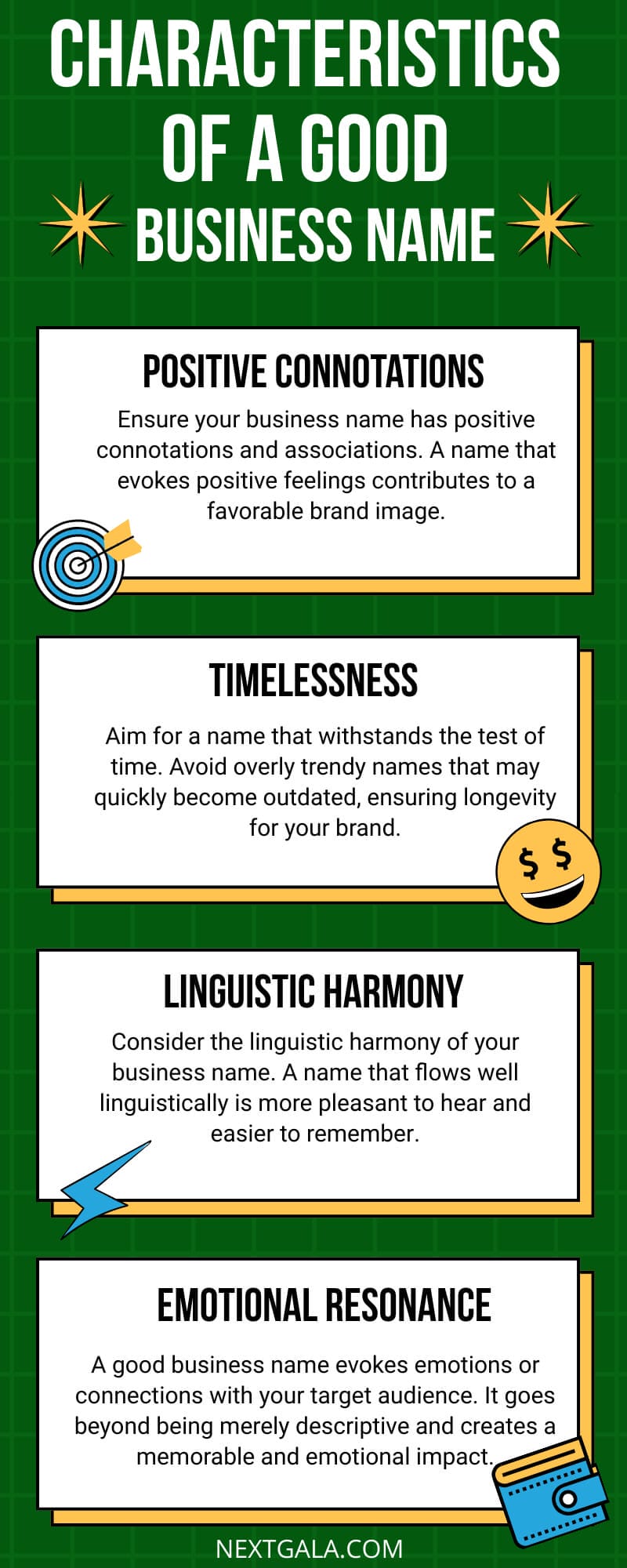Choosing the right name for your business is more than a formality—it’s your brand’s first impression. This seemingly simple decision holds the key to how your business is perceived and remembered.
Your business name is the face of your brand, a concise representation of your identity. It’s the tagline customers carry with them, shaping their perception of your values and personality.
In the digital era, where first impressions often happen online, your business name serves as a virtual storefront sign. It’s the initial handshake that invites customers to explore further.
Throughout this guide, we’ll explore how to name a business, from essential considerations to creative techniques and brainstorming. Join us as we uncover the impact a well-crafted business name can have on your brand, serving as a powerful tool to attract, engage, and leave a lasting mark in the competitive business landscape.
Why Your Business Name Matters?
In the dynamic world of business, a name is more than just a label; it’s a strategic asset that shapes the very core of your brand identity. Let’s dissect why your business name matters and the pivotal role it plays in establishing a strong brand presence.
1. First Impressions
- Significance: Your business name is the initial touchpoint with your audience, forming the foundation for the first impression.
- Example: Consider the immediate impact of a name like “Apple.” It transcends the tech industry, evoking innovation and simplicity.
2. Brand Recognition
- Significance: A well-crafted name contributes to brand recognition, making it easier for customers to identify and remember your business.
- Example: Nike’s succinct and memorable name has become synonymous with athletic excellence.
3. Reflecting Your Values
- Significance: Your business name should reflect the values and ethos of your brand, fostering a connection with like-minded consumers.
- Example: “Whole Foods” communicates a commitment to natural, organic products and a holistic approach to health.
4. Attraction and Engagement
- Significance: A compelling name attracts customers, generating interest and setting the stage for deeper engagement.
- Example: “Google” suggests a limitless exploration of information, drawing users into the vast world of online search.
5. Competitive Edge
- Significance: In a crowded market, a distinctive name provides a competitive edge, helping your brand stand out among competitors.
- Example: Tesla’s futuristic name aligns with its cutting-edge approach to electric vehicles, differentiating it in the automotive industry.
6. Emotional Resonance
- Significance: A well-chosen name can evoke emotions, fostering a positive connection between your brand and consumers.
- Example: “Coca-Cola” is not just a beverage; it’s associated with joy, happiness, and shared moments.

Types of Business Names
Business names come in various types, each serving a specific purpose or conveying a distinct brand image. Here are some common types of business names along with examples:
1. Descriptive Names
Descriptive business names are straightforward and explicitly convey the nature of the business within the name itself. These names are designed to provide a clear and immediate understanding of the products, services, or purpose of the company.
The primary goal is to leave little room for ambiguity, ensuring that potential customers can quickly grasp what the business offers. Descriptive names are especially effective in industries where clarity and transparency are crucial, helping build trust and attracting customers who are seeking specific solutions.
However, there’s a challenge in finding a balance between being descriptive and avoiding names that are too generic or limiting as the business evolves.
Examples:
- American Airlines: The name straightforwardly communicates the business’s focus on providing airline services within the United States.
- Pizza Hut: The name conveys the primary product and service – pizza in a restaurant setting.
- The Home Depot: Implies a store where customers can find a comprehensive range of products for home improvement.
- General Electric (GE): Suggests a broad spectrum of electrical and industrial products offered by the company.
- Bed Bath & Beyond: The name indicates a retail store that offers a variety of products for the home, going beyond basic necessities.
2. Brandable Names
Brandable names are unique, memorable, and often created specifically for the business. These names go beyond mere identification; they aim to establish a distinct and lasting brand identity. Coined words or creative combinations are often employed, allowing the business to carve out a niche and stand out in a crowded market.
The strength of brandable names lies in their ability to become synonymous with the brand itself, fostering recognition and recall among consumers.
While these names may not immediately convey the nature of the business, they offer flexibility for companies with diverse offerings or those aiming to transcend specific products and services.
Examples:
- Google: A creative and unique name now synonymous with internet search and a wide array of online services.
- Xerox: Coined term widely recognized for photocopiers, exemplifying a brandable and memorable name.
- Kodak: A unique name created for the brand, closely associated with the photography and imaging industry.
- Verizon: A brandable name created by blending “veritas” (Latin for truth) and “horizon.”
- Yahoo: An energetic and memorable name associated with the early days of the internet and online search.
3. Acronyms and Initials
Acronyms and initials involve using the first letters of a longer name or phrase to create a shorter, condensed representation of the business. This naming strategy is particularly effective for businesses with long or complex names, providing a concise and memorable alternative.
Acronyms can also add an element of intrigue, inviting consumers to explore the meaning behind the initials. However, the challenge lies in ensuring that the acronym aligns with the brand’s image and does not create confusion.
Successful use of acronyms can lead to a brand identity that is easily recognizable and facilitates efficient communication, especially in industries where brevity and quick recognition are paramount.
Examples:
- IBM (International Business Machines): Uses initials to represent a globally renowned technology and consulting company.
- NASA (National Aeronautics and Space Administration): An acronym representing the U.S. government agency responsible for the nation’s civilian space program.
- AT&T (American Telephone and Telegraph): Initials denote a major telecommunications company in the United States.
- CNN (Cable News Network): An acronym highlighting its focus on 24-hour news broadcasting.
- BMW (Bayerische Motoren Werke): Uses initials from the German phrase for Bavarian Motor Works, a renowned luxury car brand.
4. Compound Words
Compound words in business names involve the fusion of two or more words to create a new, cohesive term that embodies the essence of the brand. These names are crafted with the intention of capturing a unique identity that reflects the business’s values, offerings, or a distinctive characteristic.
The beauty of compound words lies in their ability to convey a layered meaning, often adding depth and nuance to the brand’s narrative. This naming strategy is versatile and allows businesses to be creative while ensuring that the resulting term is both memorable and relevant to their market.
Striking the right balance in creating compound words involves considering linguistic flow, cultural connotations, and overall resonance with the target audience.
Examples:
- Facebook: A compound of “face” and “book,” emphasizing social connections and information-sharing.
- Instagram: Merges “instant” and “telegram,” conveying the quick and visual sharing of photos.
- Snapchat: Combines “snap” (quick) and “chat” (conversation), emphasizing real-time communication.
- YouTube: Blends “you” and “tube,” reflecting user-generated video content.
- Starbucks: Joins “Starbuck,” a character from Moby-Dick, with “coffee,” creating a unique and memorable name for a coffeehouse chain.
5. Geographical Names
Geographical names incorporate a location or region into the business name, serving as a nod to the brand’s origin or a significant association. These names provide a sense of place and can carry cultural, historical, or aspirational connotations.
For businesses with strong ties to a specific location, a geographical name becomes a part of the brand’s identity, helping to establish a unique narrative. This naming strategy is often employed to evoke a particular ambiance or to convey authenticity.
However, it’s important to ensure that the geographical reference aligns with the brand’s values and resonates positively with the target audience. When executed effectively, geographical names contribute to a brand’s storytelling, fostering a connection with consumers who share an affinity for the referenced location.
Examples:
- Dell (named after founder Michael Dell): Originating from the founder’s last name, providing a personal touch to the brand.
- New York Times: Incorporates the location in the name, emphasizing its role as a prominent news source based in New York.
- Adidas (Adi Dassler): Combines the founder’s first name (Adi) with the initial of the last name (Dassler).
- Samsung (three stars in Korean): Reflects the brand’s three-star ethos and Korean origin.
- Columbia Sportswear: Evokes a sense of the rugged outdoors, associated with the Columbia River, where the company was founded.

How to Name a Business: Key Considerations
After selecting the type of business name you want to choose, here are some useful considerations for choosing a strong brand name:
1. Relevance to Your Business
Importance: A business name that reflects the nature of your business is crucial for clarity and immediate understanding. It serves as a concise introduction to your offerings, setting the right expectations for customers and stakeholders.
Example: “Pizza Hut” communicates a clear association with pizza, making it evident that the business is a pizza restaurant. This relevance simplifies the decision-making process for potential customers seeking a specific cuisine.
2. Target Audience
Importance: Considering your target audience ensures that your business name resonates with the people you aim to attract. It takes into account their preferences, values, and language, fostering a connection that goes beyond a transactional level.
Example: “Forever 21” directly targets a younger demographic, suggesting a trendy and youthful brand. The name aligns with the fashion retailer’s focus on providing fashionable clothing for the young and stylish.
3. Uniqueness
Importance: A unique and distinguishable business name sets your brand apart from competitors and enhances memorability. It creates a strong identity in the minds of customers, making it easier for them to recall and recommend your business.
Example: “Google” is a unique and coined word that has become synonymous with online search. Its distinctiveness contributes to the brand’s global recognition and dominance in the search engine industry.
4. Memorability
Importance: A memorable business name is crucial for brand recall and word-of-mouth marketing. Choosing a name that is easy to remember ensures that customers can effortlessly find and refer your business.
Example: “Amazon” is a highly memorable name, associating the vastness of the Amazon River with the company’s extensive product catalog. The name is easy to remember and has become iconic in e-commerce.
5. Pronounceability
Importance: An easily pronounceable name facilitates smooth communication and enhances customer interaction. Avoiding complex or confusing names ensures that your business name is accessible to a wide audience.
Example: “Nike” is a simple and easily pronounceable name that has become a global brand. Its clarity in pronunciation contributes to its widespread recognition and popularity.
6. Scalability
Importance: Choose a business name that allows for growth and expansion. A scalable name accommodates diversification into new products, services, or markets without losing relevance.
Example: “Starbucks” initially focused on coffee but expanded its menu to include various beverages and food items. The scalable name allowed the brand to evolve without limiting its offerings.
7. Cultural Sensitivity
Importance: Cultural sensitivity in your business name prevents potential misunderstandings and ensures that the name resonates positively across different cultures and regions.
Example: The Chevrolet car model “Nova” had to be changed in Spanish-speaking markets, as “No va” translates to “doesn’t go,” highlighting the importance of cultural sensitivity.
8. Ease of Spellability
Importance: An easily spellable name is essential for online searches, email communication, and overall accessibility. Avoiding complex spellings reduces the risk of misspelling and improves brand recognition.
Example: “Dunkin’ Donuts” simplified its name to “Dunkin'” for easier spellability and a more modern, streamlined brand image.
9. Visual Appeal
Importance: Consider how your business name looks visually. A visually appealing name contributes to brand aesthetics and can be influential in designing logos, signage, and marketing materials.
Example: “Apple” is a visually clean and simple name, contributing to the brand’s minimalist and modern visual identity. The name aligns with the company’s design-focused ethos.

Brainstorming Techniques to Come up With a Good Business Name
These are some creative brainstorming techniques to come up with a good name for your business:
1. Mind Mapping
How It Works:
- Start with a central theme, like your business or industry.
- Branch out with related concepts, services, or products.
- Explore associations, jotting down words that come to mind.
- Connect these words to generate clusters of potential names.
Example:
Central Theme: Coffee Shop
Branches: Espresso, Latte, Beans, Relaxing Atmosphere
Associations: Warmth, Aroma, Comfort, Community
Name Ideas: Aroma Haven, Espresso Oasis, Community Brew
Why It Works:
Mind mapping visually organizes ideas, helping to identify potential name elements and connections. It encourages a free-flowing exploration of related concepts, stimulating creativity.
2. Word Association
How It Works:
- Begin with a core word related to your business.
- List words associated with the core word.
- Continue branching out with associations.
- Look for combinations or derivations that form interesting names.
Example:
Core Word: Tech
Associations: Innovation, Connectivity, Future
Derived Names: Connectech, Innovatech, FutureHub
Why It Works:
Word association taps into the subconscious, revealing connections that may inspire unique and catchy business names. It fosters creativity by exploring linguistic relationships.
3. Crowdsourcing
How It Works:
- Seek input from friends, family, colleagues, or online communities.
- Pose questions about your business, its values, or offerings.
- Compile a list of suggested names and feedback.
- Analyze the diverse perspectives and consider novel ideas.
Example:
Question: “What words come to mind when you think about our eco-friendly home goods store?”
Responses: Green Haven, EarthNest, SustainableSpaces
Why It Works:
Crowdsourcing leverages the collective creativity of a group, providing varied perspectives and potentially uncovering unique name suggestions.

Additional Brainstorming Techniques
4. Reverse Brainstorming
How It Works:
- Identify potential negatives associated with your business.
- Reverse these negatives into positive or creative elements.
- Explore names that emphasize the positive aspects.
Example:
Negative: “Limited Space”
Positive: “Cozy Corner,” “Intimate Nook”
Why It Works:
Reverse brainstorming challenges assumptions, turning perceived drawbacks into opportunities for creative naming.
5. Random Word Generator
How It Works:
- Use online tools to generate random words.
- Connect these words to your business or industry.
- Explore how these unrelated terms can inspire unique names.
Example:
Generated Words: Radiant, Cascade, Velocity
Derived Names: Radiant Tech, Cascade Innovate, Velocity Solutions
Why It Works:
Random word generation introduces unexpected elements, triggering creative associations that may lead to novel and distinctive business names.
6. Competitor Analysis
How It Works:
- Analyze names of successful competitors.
- Identify common themes or naming conventions.
- Use this analysis as inspiration for your own unique twist.
Example:
Competitor Names: FitFusion, ActiveCore, DynamicLife
Derived Names: VitalBlend, EnergizeHub, PinnacleMotion
Why It Works:
Competitor analysis provides insights into naming trends within your industry, helping you create a name that stands out while fitting the industry landscape.
Legal Considerations When Choosing a Business Name
1. Trademark Search
Before finalizing a business name, conduct a thorough trademark search to ensure that the name is not already registered or in use by another business. Trademarks protect brand identities and prevent confusion in the marketplace.
How to Perform a Trademark Search
- Use online databases like the United States Patent and Trademark Office (USPTO) or your country’s equivalent.
- Check for similar or identical trademarks in your industry.
- Consider hiring a trademark attorney for a comprehensive search.
Example:
Scenario: You plan to name your clothing brand “Epic Apparel.”
Result: A trademark search reveals an existing registration for “Epic Clothing” in the same industry, prompting you to reconsider your name to avoid legal issues.
2. Domain Availability
In today’s digital age, securing a matching domain name is crucial for online visibility and brand consistency. Check the availability of the domain associated with your business name to avoid conflicts and confusion.
How to Check Domain Availability:
- Use domain registration websites like GoDaddy or Namecheap.
- Ensure the domain is available in relevant extensions (e.g., .com, .net, .co).
Example:
Scenario: Your chosen business name is “Peak Performance Fitness.”
Result: Checking domain availability reveals that peakperformancefitness.com is already taken, but peakperformancefit.com is available, providing an alternative for your online presence.
Mistakes to Avoid When Naming a Business
Here are some common mistakes to avoid when choosing a business name:
1. Ignoring Trademark Searches
Mistake: Neglecting to conduct thorough trademark searches can lead to legal conflicts if another business has already registered or is using a similar name.
Example: Imagine a startup named “SwiftByte Solutions” without conducting a trademark search. Later, they discover that another company in the same industry already holds the trademark for “SwiftByte.” This oversight could result in legal disputes and potential rebranding efforts.
2. Choosing a Name Too Similar to Competitors
Mistake: Selecting a name that closely resembles a competitor’s name can cause confusion among consumers and dilute the distinctiveness of your brand.
Example: If a new smartphone company chooses the name “iPhoneTech,” it risks being associated with Apple’s iPhone, leading to brand confusion and potential legal challenges.
3. Neglecting Domain Availability
Mistake: Failure to check the availability of a matching domain name can create inconsistencies in branding and hinder your online presence.
Example: Suppose a new e-commerce business decides on the name “EcoGoods,” only to find out that ecogoods.com is already taken. This oversight can result in a less cohesive online identity.
4. Overlooking Cultural Sensitivity
Mistake: Not considering cultural nuances when naming a business may lead to unintentional offense or misrepresentation, alienating potential customers.
Example: Choosing a name like “Spirit Animal Apparel” without understanding the cultural significance of the term “spirit animal” can offend certain communities and harm the brand’s reputation.
5. Choosing a Geographically Limiting Name
Mistake: Opting for a name tied solely to a specific location can hinder future expansion plans and limit the global appeal of the business.
Example: A restaurant named “Downtown Delights” might face challenges if it decides to expand to other cities or countries, as the name implies a specific geographical location.
6. Ignoring Target Audience Preferences
Mistake: Neglecting to consider the preferences and values of the target audience may result in a name that doesn’t resonate with or attract the intended customer base.
Example: If a company targeting millennials in the tech industry chooses a name like “SilverTech Solutions,” it may fail to connect with its younger audience due to the name’s association with an older demographic.
7. Selecting a Name with Confusing Spellings
Mistake: Choosing a name with unconventional or confusing spellings can make it difficult for customers to find the business online or through word of mouth.
Example: A tech startup naming itself “InnoV8tiv” instead of the conventional “Innovative” may face challenges in online searches and brand recognition.
8. Overcomplicating the Name
Mistake: Opting for a name that is overly complex or convoluted can hinder effective communication, making it harder for customers to remember and relate to the brand.
Example: A consulting firm naming itself “Synergistic Innovations Corporation for Strategic Enterprise Solutions” may struggle with brand recall and effective communication due to its overly complex name.
9. Relying Solely on Trends
Mistake: Choosing a name based solely on current trends may result in an outdated or irrelevant brand identity as trends evolve.
Example: A fitness app named “Y2KFit” may have been trendy in the early 2000s but could feel outdated and irrelevant in the current market.
10. Failing to Future-Proof the Name
Mistake: Not considering the potential for business growth and evolution may result in a name that becomes obsolete as the company expands.
Example: A skincare brand naming itself “Glowing Skin Essentials” might face challenges if it later expands into wellness products beyond skincare, making the name too restrictive.
Avoiding these mistakes requires careful consideration, research, and a forward-thinking approach to ensure a strong, legally sound, and adaptable business name.
Frequently Asked Questions (FAQs) About How to Name a Business
Q1: Why is choosing the right business name important?
The right business name is crucial because it forms the foundation of your brand identity. It impacts how customers perceive your business, influences brand recall, and can contribute to your overall success. A well-chosen name sets the tone for your brand and helps you stand out in the market.
Q2: What key considerations should I keep in mind when naming my business?
Consider relevance to your business, appeal to your target audience, uniqueness, memorability, and scalability. Ensure the name is easy to pronounce, visually appealing, and culturally sensitive. Check domain availability and conduct thorough trademark searches to avoid legal issues.
Q3: How do I brainstorm creative business name ideas?
Use techniques like mind mapping, word association, and crowdsourcing. Consider your business’s values, mission, and target audience. Be open to diverse perspectives and explore various combinations of words and concepts to generate unique and memorable name ideas.
Q4: What legal considerations should I take into account when naming my business?
Perform a trademark search to ensure the chosen name is not already in use. Check domain availability and register it promptly. Avoid names that may infringe on existing trademarks, and be culturally sensitive to prevent unintentional offense.
Q5: Can I change my business name in the future?
Yes, it’s possible to change your business name, but it’s advisable to choose a name with longevity to avoid confusion and brand identity issues. If a name change becomes necessary, plan it strategically, considering the impact on customers and the overall brand image.
Q6: How do I ensure my business name resonates with my target audience?
Understand the preferences, values, and language of your target audience. Consider conducting surveys or focus groups to gather feedback on potential names. A name that resonates with your audience can enhance brand connection and engagement.
Q7: Should I choose a trendy name for my business?
While trendy names can be appealing initially, they may quickly become outdated. It’s often better to choose a name with timeless appeal to ensure longevity and relevance as trends evolve.
Q8: What role does domain availability play in naming a business?
Domain availability is crucial for creating a consistent online presence. Ensure that the domain associated with your business name is available in relevant extensions (.com, .net, etc.) to avoid confusion and maintain a cohesive online identity.
Q9: Is it necessary to hire a professional for help in naming my business?
While not mandatory, seeking input from professionals such as branding experts or trademark attorneys can provide valuable insights and ensure that your chosen name aligns with legal and branding best practices.
Q10: How can I test if my business name resonates with my audience?
Conduct surveys, focus groups, or social media polls to gather feedback from your target audience. Pay attention to their reactions, associations, and overall perception of the name. Testing ensures that your chosen name effectively communicates your brand message.
Conclusion
In conclusion, the process of naming your business requires thoughtful consideration and strategic planning. Take your time to explore the nuances of your brand, involve others in the brainstorming process, and ensure that your chosen name aligns seamlessly with your business vision.
Remember, your business name is more than just words; it’s the foundation of your brand identity, a reflection of your values, and the first impression you make on your customers.
So, embark on this journey with patience and creativity. Your business name is a powerful asset that, when chosen wisely, can set the stage for success and leave a lasting impact in the minds of your audience.
Best of luck in finding the perfect name that will propel your business to new heights!
Related Posts:
Uncommon Business Names Ideas To Inspire You
Cool Clothing Brand Names Ideas for Entrepreneurs